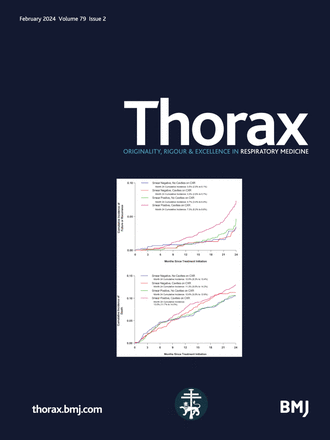溶栓/替扎卡弗特/依瓦弗特对囊性纤维化全身性炎症的影响
IF 7.7
1区 医学
Q1 RESPIRATORY SYSTEM
引用次数: 0
摘要
背景尽管有显著的临床改善,但有证据表明,在接受elexaftor /tezacaftor/ivacaftor (ETI)治疗的囊性纤维化(CF)患者中存在持续的气道炎症。由于CF是一种多系统疾病,全身免疫谱可以反映肺部和其他器官的局部炎症。了解ETI治疗后的全身性炎症可能会揭示重要的翻译见解。本研究旨在描述全身炎症变化,并将其与ETI治疗观察到的有充分记录的改善联系起来。方法我们对57名CF患者进行了一项单中心纵向研究。所有参与者均为Phe508del纯合子或Phe508del/最小功能。在eti前和治疗开始后3-12个月采集血样。分析包括基于质谱的蛋白质组学,多重免疫分析,以及外周血免疫细胞计数和表型的流式细胞术。对照样本由29名年龄匹配的健康对照提供。结果ETI治疗可减轻全身炎症反应;然而,免疫特征仍然不同于健康对照。ETI减少了中性粒细胞计数,并与更成熟、更少炎症的表型相关,以及向与CD206表达增加相关的免疫分解状态的转变。已知影响中性粒细胞水平的细胞因子随治疗降低。尽管接受了ETI治疗,与健康对照相比,中性粒细胞和单核细胞计数仍然升高。全身性炎症的改善与肺功能之间没有明显的关联。结论尽管接受了ETI治疗,CF患者仍表现出持续的全身性炎症,这可能对呼吸系统和其他器官系统产生长期潜在的不良影响。如有合理要求,可提供资料。本文章由计算机程序翻译,如有差异,请以英文原文为准。
Effect of elexacaftor/tezacaftor/ivacaftor on systemic inflammation in cystic fibrosis
Background Despite significant clinical improvements, there is evidence of persisting airway inflammation in people with cystic fibrosis (CF) established on elexacaftor/tezacaftor/ivacaftor (ETI) therapy. As CF is a multi-system disease, systemic immune profiles can reflect local inflammation within the lungs and other organs. Understanding systemic inflammation after ETI therapy may reveal important translational insights. This study aims to profile systemic inflammatory changes and relate these to the well-documented improvements observed with ETI therapy. Methods We conducted a single-centre longitudinal study with 57 CF subjects initiating ETI therapy. All participants were Phe508del homozygous or Phe508del/minimal function. Blood samples were collected pre-ETI and 3–12 months post-therapy initiation. Analyses included mass spectrometry-based proteomics, a multiplex immunoassay, and flow cytometry for peripheral immune cell counts and phenotype. Controls samples were provided by 29 age-matched healthy controls. Results Systemic inflammation reduced with ETI therapy; however, the immune profile remained distinct from healthy controls. ETI reduced neutrophil counts and was associated with a more mature, less inflammatory phenotype, as well as a shift towards an immune resolving state associated with increased CD206 expression. Cytokines known to influence neutrophil levels reduced with therapy. Despite ETI therapy, neutrophil and monocyte counts remained elevated compared with healthy controls. There was no obvious association between the ETI-related improvements in systemic inflammation and lung function. Conclusions Patients with CF showed evidence of persisting systemic inflammation despite ETI therapy, which may have long-term potentially adverse effects on respiratory and other organ systems. Data are available on reasonable request.
求助全文
通过发布文献求助,成功后即可免费获取论文全文。
去求助
来源期刊

Thorax
医学-呼吸系统
CiteScore
16.10
自引率
2.00%
发文量
197
审稿时长
1 months
期刊介绍:
Thorax stands as one of the premier respiratory medicine journals globally, featuring clinical and experimental research articles spanning respiratory medicine, pediatrics, immunology, pharmacology, pathology, and surgery. The journal's mission is to publish noteworthy advancements in scientific understanding that are poised to influence clinical practice significantly. This encompasses articles delving into basic and translational mechanisms applicable to clinical material, covering areas such as cell and molecular biology, genetics, epidemiology, and immunology.
 求助内容:
求助内容: 应助结果提醒方式:
应助结果提醒方式:


